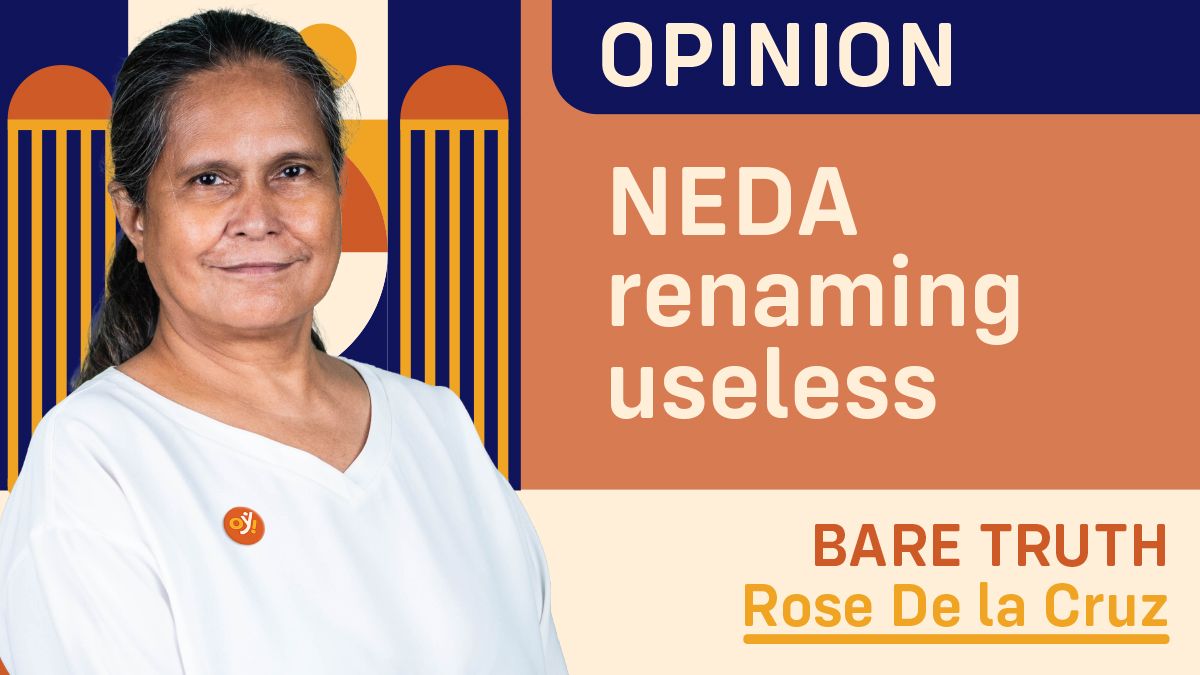Last July 31, I read in Business Mirror the plan of the National Economic and Development Authority to have a name change o Department of Economy, Planning and Development (DepDev) to help address the issue of linking national plans to the budget and improve evaluation of government projects, according to Socioeconomic Planning Secretary Arsenio M. Balisacan.
During the Commonwealth period, then President Manuel L. Quezon the National Economic Council was inaugurated, as an advisory body for economic and financial matters and formulate an economic program based on national independence.
The Council’s eight members met on February 14, 1936 and was organized into eight committees.
After the war, the first Congress under then President Carlos P. Garcia saw the need to create a new office in charge of the supervision of government corporations, which he called National Development Authority.
When Congress passed the law creating NDA increasing the membership by one to include the secretary of commerce and industry. The council performed its functions throughout the Third Republic until the declaration of Martial Law in 1972, when President Marcos Sr. named it as National Economic Development Authority (without the conjunction and).
He issued Presidential Decree 1 on September 24, 1972 (known as the Integrated Reorganization Plan for development planning and program implementation to correct the deficiencies of the existing system. The decree merged the NEC and the Presidential Economic staff (created by EO 8 of 1966) and renaming it to NEDA (sans the and). President Marcos Sr. subsequently issued Presidential Decree No. 1-A which delineated the composition of the NEDA.
In the Business Mirror story, current NEDA Secretary Balisacan said “the problem of linking the regional development priorities to the national, I think that we have institutionalized that within NEDA. But linking the national plans to the budget is a very challenging issue,” Balisacan explained during a Senate hearing of the Committee on Economic Affairs on Tuesday.
“And while over the years DBM [Department of Budget and Management] and NEDA have been cooperating, coordinating their actions in relation to getting that matching of the plans and budget, the arrangements have been quite ad hoc and depending on the secretary who sits there and who sits at NEDA… It may be sustained or not,” Balisacan noted.
“So because it’s not institutionalized….it’s not put in the respective mandates. So I think that’s what we are trying to address in this (proposed measure),” he added.
Balisacan underscored during the Senate hearing the importance of reorganizing NEDA into Depdev to “act as the primary agency of the Executive Branch for policy, planning, coordinating and monitoring socio-economic matters.”
Balisacan emphasized the need to reorganize NEDA into Depdev, which stemmed from NEDA’s formulation of Ambisyon Natin 2040, the country’s “long-term collective vision of a Matatag, Maginhawa at Panatag na Buhay for all Filipinos.”
With this, Balisacan said, “We saw the need to institutionalize the formulation of this long-term vision.”
He explained that medium- and long-term development roadmaps must “transcend” political cycles and accompanying policy initiatives, legislative priorities, government programs and projects must be sustained and implemented consistently over decades, not just a few years.
“The reorganization of NEDA into DepDev would strengthen Neda’s mandate and give the agency equal footing with other executive departments, thereby reinforcing such linkages,” said Balisacan.
The reorganization will help ensure that “well-crafted plans do not remain just that.” Beyond that, policies and projects that the government approves will be “adequately” monitored.
Further, the progress of these projects will be “rigorously” evaluated and examine the “effectiveness in realizing intended outcomes.”
“We are trying to strengthen the evaluation of government projects,” Balisacan underscored, “because we really don’t have a systematic process of seeing whether the projects that are being supported, the programs that are being funded are working or achieving their objectives or not.”
My take
Renaming is just a waste of Congress’ time. If NEDA has been mandated to do policy, planning and monitoring of plans based on a roadmap, then why go change the nomenclature, which I am sure would just lead to an expansion of the bureaucracy.
Sure, we need to institutionalize systems and protocols but that can be done at the executive level, no need for another law that would stipulate another bureaucratic level to operate it, hence another budgetary raise for the same functions of the current agency.
I think there is the lack of coordination or rapport among the Cabinet members of NEDA, esp. with the Bangko Sentral, DBM and Department of Finance– as evidenced by the repetitive and redundant explanations of economic realities particularly the projections and annual reportage on inflation, money supply and interest rates. There is also discord in the Cabinet-level department heads on projects for new priority projects for approval, extension on the terms and deadlines of ongoing projects and budgetary insertions based on political lobbying by members of Congress and favored political supporters with the NEDA board (currently chaired by the President).
In which case, I am against renaming NEDA (now with the conjunction and) because “it ain’t broke, so why fix it.”
All that needs to be done is improve the rapport of the members Cabinet members involved and try not to encroach on someone else’s turf.
#WeTakeAStand #OpinYon #OpinYonColumn #ColumnbyRosedelaCruz #BareTruth
